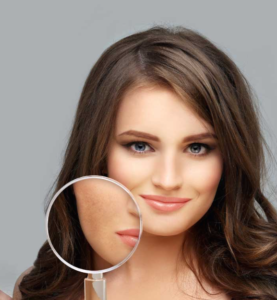What is Melasma and what is the best treatment for it?
Melasma is a skin condition characterized by dark patches, typically on the face, that are often triggered by hormonal changes, sun exposure, or genetics. While there is no cure for melasma, there are various treatments that may help lighten or reduce the appearance of dark patches. It’s essential to consult with a dermatologist to determine the most appropriate treatment for your specific case. Here are some common treatments for melasma:

Topical Treatments:
Hydroquinone: A skin-lightening agent that can help fade dark spots. It is available in both over-the-counter and prescription formulations.
Tretinoin and Corticosteroids: These can be used in combination with hydroquinone to enhance its effectiveness.
Azelaic Acid: Another topical treatment that may help reduce pigmentation.
Chemical Peels:
Chemical peels involve applying a chemical solution to the skin to exfoliate the top layer, leading to the improvement of melasma. Peels containing ingredients like glycolic acid or trichloroacetic acid may be used.
Laser Therapy:
Various laser treatments, such as fractional laser or intense pulsed light (IPL), can target the pigmented cells and break them down, leading to a reduction in melasma.
Microdermabrasion:
This procedure involves exfoliating the outer layer of skin, which can help improve the appearance of melasma’s.
Sun Protection:
Strict sun protection is crucial for managing melasma. Always use a broad-spectrum sunscreen with a high SPF, and reapply it every two hours, especially when spending time outdoors.
Cosmetic Camouflage:
Makeup can be used to cover up melasma and even out skin tone.
It’s important to note that results can vary from person to person, and some treatments may require multiple sessions to achieve the desired effect. Additionally, certain treatments may not be suitable for everyone, and a dermatologist can provide personalized recommendations based on your skin type and the severity of your melasma. Always consult with a healthcare professional before starting any new skincare or treatment regimen.





